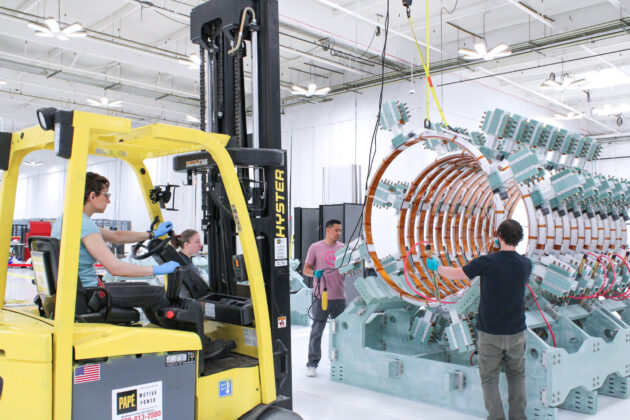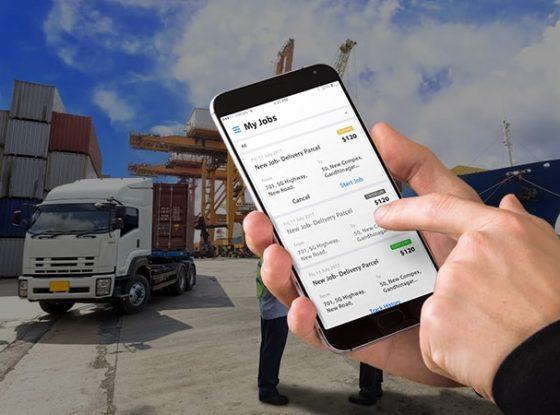As AI use surges, tech companies race to secure clean energy and preserve climate goals

The rapid growth of artificial intelligence is driving new demand for cloud computing infrastructure operated by tech giants including Amazon and Microsoft, which are investing billions of dollars each year into the construction of data centers that gobble massive amounts of energy.
The trend has created a paradox for the Seattle-area companies that have set bold climate goals to slash their carbon emissions ahead of international targets — but now have rising energy needs thanks to a surge in generative AI interest that is stoking their businesses.
Projections for future energy needs for data centers are startling. The amount of electricity used globally for data centers, AI and cryptocurrency could double from 2022 to 2026, according to the International Energy Agency. In the U.S. alone, data center operations are expected to account for 6% of America’s total electricity use within two years.
Finding enough energy to power these computing hubs “is a huge bottleneck,” OpenAI CEO Sam Altman said on the latest episode of the “All-In” podcast.
For now, energy sources such as coal and natural gas are being tapped to feed data center electricity needs.
Meanwhile, Amazon and Microsoft continue to ink green power deals. Amazon for years has ranked as the No. 1 corporate purchaser of clean power globally, while Microsoft is No. 2, according to BloombergNEF.
Microsoft earlier this month signed the largest renewable energy purchase deal ever made by a corporation, locking in 10.5 gigawatts to fuel a fraction of its data center operations worldwide. The agreement between Microsoft and Brookfield Asset Management’s green energy arm will support projects in the U.S., Europe, Asia and Latin America.
In March, news broke that Amazon Web Services is spending $650 million on a data center in Pennsylvania that’s plugged into the nation’s sixth largest nuclear power plant, providing up to 960 megawatts of carbon-free energy for its operations.
“We’re on a path to power our operations with 100% renewable energy by 2025 — five years ahead of our original 2030 target,” an Amazon spokesperson said via email.
But the green power opportunities are getting harder to come by, said Sarah Delp, global director of buyer engagement for LevelTen Energy, a Seattle company helping organizations make renewable power purchases.
The market for clean energy projects is becoming “even more competitive, with fewer attractive projects to choose from,” said Delp, who added that “organizations with sustainability goals should act with speed to secure [power purchase agreements] now.”
Nancy Hirsh, executive director of the nonprofit NW Energy Coalition, praised Microsoft’s latest energy deal, but she also called on the company to prioritize initiatives that curb the need for more energy.
“A critical aspect of this commitment should include a similar commitment from Microsoft to advance energy efficiency, energy conservation and management of data center and customer demand to reduce the amount of new development that is needed,” Hirsh said by email.
Hirsh added that another key concern is making improvements to the energy grid so it can handle the increased power loads, and she urged tech companies to partner with utilities and transmission system operators in this work.
Companies offer assurances that they’re addressing these issues. Microsoft last month shared information on its efforts to make AI operations more sustainable. Amazon likewise touts the ways it pursues energy savings in its cloud services and infrastructure, including the development of its own efficient computer chips for training AI models.
And while AI is creating the energy crunch, it can also help solve it. AI is being applied to research to optimize the electric grid’s performance; the development of newer climate technologies including advanced batteries and nuclear power; and streamlining permitting for deploying power plants, among other efforts.
The issue is drawing increasing concern. U.S. Energy Secretary Jennifer Granholm and Sen. Maria Cantwell met in Seattle earlier this year with tech executives, and AI was a key topic of discussion — both its huge appetite for energy and its ability to solve some of the power problems it creates.
The companies acknowledge the worries. Microsoft was part of an opinion piece recently published in the journal Nature titled: “Will AI accelerate or delay the race to net-zero emissions?” Leaders from the company helped author the paper, which urged researchers to quantify the potential effects of AI expansion.
“This challenge has to be solved using a variety of technologies and solutions,” LevelTen’s Delp said via email. “In addition to continued demand for wind and solar, we expect to see increases and advancements in new technologies such as batteries, small modular reactors, carbon capture and more.”
Tech interests are helping stoke development of these new technologies — including some of the most ambitious initiatives.
A year ago, Microsoft and Helion Energy announced a historic power purchase agreement in which the cloud company will buy electricity from the fusion startup. However Helion, as well as every other fusion effort, is yet to demonstrate that it can commercially generate power.
OpenAI’s Altman is making big investments in nuclear energy efforts — both fusion as well as the fission that powers existing reactors. OpenAI and Microsoft are close partners, and Altman is an investor in Helion.
Speaking at an event at the World Economic Forum in Davos earlier this year, Altman said the future of AI is predicated on dramatic advancements in the availability of clean power.
“There’s no way to get there without a breakthrough,” he said. “We need fusion or we need like radically cheaper solar plus storage or something at massive scale.”
Source : geekwire.com



